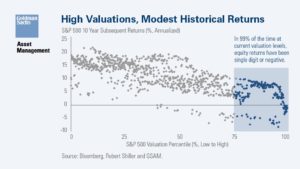James Montier of GMO in an interview with Barron’s this past weekend took a shot at investors who have decided to take a more passive approach to investing. In a discussion about historically expensive stock and bond markets he said:
You cannot describe yourself as an investor if you are going passive. You are welcome to call yourself a speculator, but you honestly can’t say you care about expected returns if you are going passive at this time.
There is plenty to unpack in the interview. Cullen Roche at Pragmatic Capitalism does a good job of clarifying what Montier might mean. Roche writes:
These generalities cause many people to conclude that passive investors are basically quitters who don’t care about market valuations and are throwing in the towel by foregoing any sort of thoughtful analysis. But this idea that indexing is average is wrong. The data shows that low fee index funds consistently beat high fee stock pickers.
Even Ed Thorp, author of A Man for All Markets, who could be described as one of the greatest investors ever says that the vast majority of investor who do well to become passive investors. Thorp wrote:
The first group of investors are those who do not want to do a lot of work who should invest in indexes. Index investors do better than maybe 90% of all other investors who are busy paying fees to advisers.
But what if Montier is right about the US stock market being uniquely overvalued? More Thorp:
Sell down to the sleeping point. As far as asset classes go, it is hard to know when you are in a bubble, and if you are in one, when it will pop.
 This chart from GSAM drew a slew of commentary on Twitter after I linked to in Sunday’s linkfest. To me the chart says two things. The first is that US stocks relative to their own history expensive. Return expectations going forward should be somewhat muted. David Merkel’s model puts forward 10-year returns between 0.5% and 6.8% over this period.
This chart from GSAM drew a slew of commentary on Twitter after I linked to in Sunday’s linkfest. To me the chart says two things. The first is that US stocks relative to their own history expensive. Return expectations going forward should be somewhat muted. David Merkel’s model puts forward 10-year returns between 0.5% and 6.8% over this period.
That being said that is still a wide range of potential outcomes. Let’s call it plus or minus 10%. In my mind that is a pretty wide range. If nothing else this should give us some pause when it comes to making huge asset allocation shifts.
Coming back to Montier. I get it. Asset allocators gotta allocate. Clients don’t pay for a static allocation. To his credit, Montier has been right to shift equity exposure from the US into emerging markets. That being said no one has a crystal ball. Montier may be proven ultimately correct and mean reversion will rear its ugly head and make everyone invested in US equities miserable. Then again maybe not.
Asset allocators may have to allocate, but they don’t have to hate. So don’t take Montier’s comments about ‘passive investors’ too personally. (He also took a shot at Warren Buffett as well.) Just shake it off.








